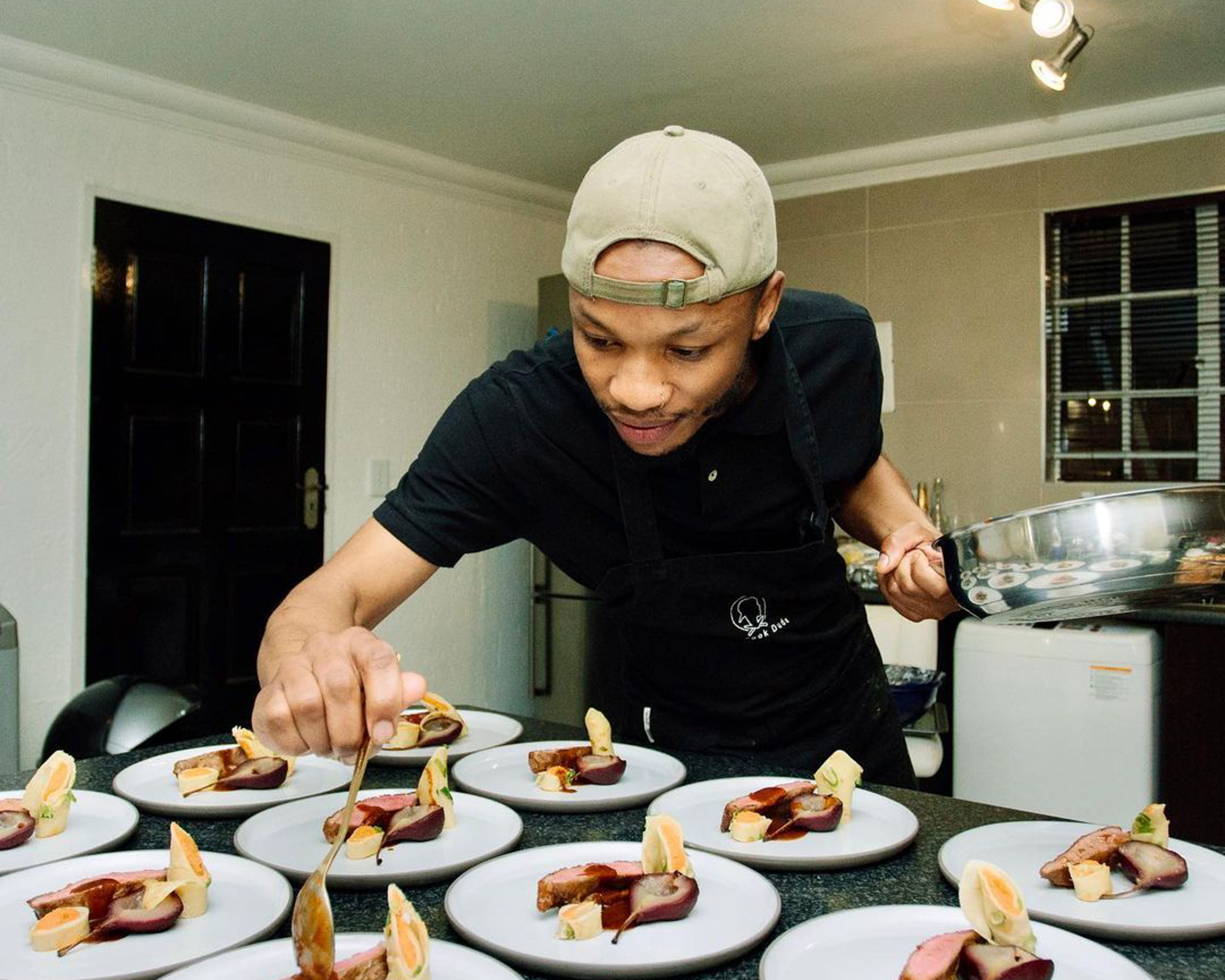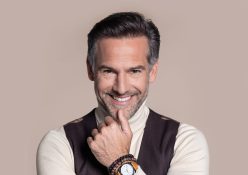At 30, Ayabonga Gope is taking on the South African private chef game, and is winning hands down.
Who is Chef Aya?
In short, I’m a private chef based in Cape Town. But becoming a chef was never something that I thought I could achieve. Growing up, I lived between Cape Town with my mom and in the Eastern Cape with my aunt. My mother had two jobs and she would come home at 9 pm at night. Instead of not cooking at all, she taught me how to cook rice so that when she came home from work, she could make a gravy or roast something to have with the rice. Most of the time though, she would be tired and make eggs. So, we would have rice, eggs and tomato sauce for supper. She was just trying to make a meal and make things a bit easier for herself, not knowing that she was planting a seed. It also led to me being the kid who would tell friends to bring various ingredients like tomatoes and rice so that we could go to the bush and start cooking.
As a child, you lived between Cape Town and the Eastern Cape. What was that like for you?
I didn’t mind going back and forth because it meant that everyone wasnice to you and you could get whatever you want [laughs]. So I didn’t want it to stop because I knew that once it stopped it was going to be back to reality. I remember that at some point in my life, I managed to convince myself that everything that happened on TV was fake. I think that I did that as an attempt to protect myself and to try and be comfortable with what I had at that moment. Funnily enough, and I still say this to people, is that then I was the happiest kid ever. I was the happiest kid knowing that what I had was enough.
Having developed that type of mindset at such an early age must definitely have helped shape the person you became…
Definitely. And it was my own thing, I didn’t want anyone to know that’s what I was thinking or going through. At the end of the day I was never someone who liked to ask for anything. If I didn’t have it, I didn’t have it. I had too much pride and I didn’t want people to see me as someone who just wants all the time. Instead, what I started doing was going to the guy who owned one of the big shops [in the area]. In a way, he helped raise my mum, so he was like an uncle in a way and my mum said I should go to him after school if my aunt wasn’t at home. I enjoyed going there because I knew that there would always be some meat or a kota for me to eat… My aunt was a very nice person who got paid weekly, so every Friday there would be a whole lot of people who you wouldn’t see at any other times coming to the house, eat all the food and leave nothing. So, at an early age, I learned to take the food that my mom brought back to the Eastern Cape (like maize meal) and bury it in the backyard so that we would always have something to eat. Thinking back now, I don’t know why I did that or how I knew to do that but I’m so grateful that I even thought of it.
Is there a moment that you can pinpoint as the one that sparked your interest in food/cooking?
I remember when I moved to Cape Town to come stay with my mum, I was interested in being with the women who would cater for funerals and functions. And I found myself trying new things out at home. In Cape Town, I again did that thing where I would get each of my friends to bring something from home for us to cook. And at some point our neighbour came to my mom and told her what I was doing. They were joking about it though, because it was not something that was seen as [a career for men]. Looking back, I suppose that I was preparing for what I would become. At the same time it was interesting for me, because in high school I still didn’t think of it as a career possibility. But I have never been the type of person who knows exactly what it is that he likes. Even today, I wouldn’t be able to tell you specifically what my favourite things are, like what I like to eat, to do or even my favourite colour. I find myself going back to what my friends and the people I know like. So, I always ended up giving people different answers until I reached a point where I just say that I don’t know…
Listening to that, do you think you suffer from imposter syndrome?
I used to. But ever since I became a private chef everything has changed. No one knew that I was a chef. I would hide it from people because I think that people believed that there is a certain way that you should look as a chef. I recall a time when I told people that I was a chef and everyone was ‘No, man. You can’t be a chef. You don’t look like one…’ And for some reason, I was heartbroken by that because that was something that everyone told me, and being around people my age and they are saying the same thing it was so heartbreaking that I literally had to hide it from people. Instead, I would say that I was a waiter and a student. At the time, I did not have the knowledge that I do now and I don’t think that being a chef was seen as a cool thing. I would go to work dressed up and end up getting into trouble at work because I did not look presentable for what I was meant to be doing, but I was so tired of people’s comments. Eventually I told myself to embrace who I am – a chef. Because being that brought comfort to me. I only really started speaking about my career once I was on Top Chef SA, because then I couldn’t hide it anymore.
Let’s talk about Top Chef SA. You ended up being the runner-upon the show, what was the experience like?
Being on TV wasn’t something that I ever really thought about. But having the opportunity to be on Top Chef came with so many questions, like ‘I’m young. Why me?’ My boss at the time spoke to me and told me to take the chance, and I did. If it weren’t for the show, I would not have developed my confidence in the way that I did.
You went from working in restaurants and at hotels to become a private chef. Why the change?
I always tell people that if there is one thing that nobody can take away from me, it’s hard work. Looking back on all the work that I did for other people [chefs] and I look at what and how I do things now, I’m so grateful for the experience that I gained with them, but it also made me realise that I wanted to work for myself. Many people thought that I wouldn’t be able to make as a private chef in Cape Town and when I resigned from my job at the time, I had no plan. But my mom told me that it was ok, that they would help me.I approached a number of private chefs to teach me the ins and outs of this side of the industry and all the time I put in with them paid off. For me, being a private chef is perfect for me because I’m such a people person. I also enjoy the freedom that being a private chef gives me while I can still respect the art of it.
Your industry took a massive hit with the COVID-19 pandemic. How did you navigate this time?
It was hard at first and I took time to focus on my mental health. In terms of work for me though, I made the most of it. I had become a private chef before lockdown and started marketing myself even harder during the time. And because people couldn’t go out to enjoy their usual culinary experiences, they would contact me so that they could have the experience in the comfort of their own home. So, as far as my business goes, it was a weird blessing.
You are also often seen as a guest chef on Afternoon Express. Tell us about that.
I was two-minded about doing the show because I get so nervous on TV, but my mom convinced me to go for it. It was a great opportunity and it resulted in me saying yes to almost anything that comes along because it will help to grow my experience, and what is life without taking risks?
Any advice for people who are looking to add ‘eat better’ to their list of new year’s resolutions?
I’m big on not wasting food, so people should know how to repurpose left-overs. Generally though, people must remember to work hard even when others aren’t looking because you grow the most when no one is watching.
Interview: Megan Paulse
Photography: @aya_thecookdude via Instagram







